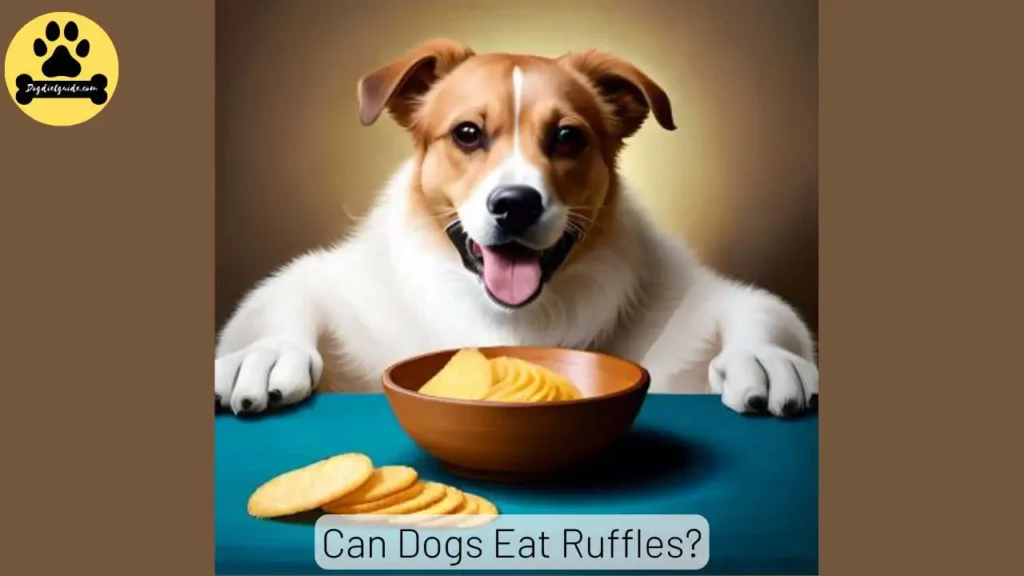When sharing our favorite snacks with our canine companions, it’s important to consider their health and safety. One common snack many of us enjoy is Ruffles, those crispy and flavorful potato chips. But can dogs eat Ruffles?
Can Dogs Eat Ruffles?

No, like many potato chips, ruffles are high in salt, unhealthy fats, and artificial flavors. These ingredients can be detrimental to a dog’s health. Excessive salt intake might lead to sodium ion poisoning, causing symptoms like vomiting, diarrhea, excessive thirst, and even seizures.
Moreover, the high-fat content in Ruffles can contribute to obesity and pancreatitis in dogs.
Health Risks of Ruffles for Dogs
Is Ruffles safe for dogs? Feeding canines human food, especially processed snacks like Ruffles, can pose several health risks. Ruffles containing ingredients that can be problematic for dogs.
Some potential health risks of feeding Ruffles or similar snacks to dogs include:
High-Fat Content
Ruffles and similar snacks are often high in fat, which can lead to obesity in dogs. Obesity elevates the likelihood of a range of health complications, including diabetes, joint issues, and cardiovascular diseases.
Salt & Sodium
Snacks are typically high in salt and sodium, which can harm puppies.
Excessive salt consumption can lead to electrolyte imbalances, dehydration, and increased blood pressure.
Artificial Flavors & Additives
These snacks often contain artificial flavors, colors, and preservatives that can pose digestion challenges for furry friends, potentially leading to gastrointestinal discomfort.
Onion & Garlic Powder
Some flavored versions of Ruffles might contain onion and garlic powder, which are toxic to dogs.
Even trace amounts of these components can harm a dog’s red blood cells, resulting in anemia.
Choking Hazard
The crispy and hard texture of potato chips like can pose a choking hazard to dogs, especially smaller breeds.
Pancreatitis
The high-fat content of these snacks can trigger pancreatitis in canines, a painful and potentially life-threatening inflammation of the pancreas.
Digestive Issues
Pets have different digestive systems than humans, and the ingredients in Ruffles can lead to upset stomach, vomiting, diarrhea, or other gastrointestinal issues.
Allergies
Dogs have the potential to develop allergies or sensitivities to specific components found in processed human foods.
Predicting their reaction to these ingredients before consumption is challenging.
Caloric Imbalance

Feeding dogs high-calorie snacks like Ruffles without considering their overall diet can lead to an imbalance in their daily caloric intake, contributing to weight gain and associated health problems.
Lack of Nutritional Value
Ruffles provide little to no nutritional value for puppies.
Instead of nourishing your pet, these snacks can contribute to empty calories and potentially displace healthier foods from their diet.
Alternatives to Ruffles for Dogs
While Ruffles potato chips may not be a suitable snack for your canine companion, you can offer plenty of healthier alternatives as an occasional treat.
- Plain Popcorn:
- Air-popped popcorn without added salt or butter can be a safe and low-calorie dog snack. However, removing unpopped kernels is essential to prevent choking hazards.
- Fresh Fruits and Vegetables:
- Many fruits and vegetables, such as apples, carrots, and green beans, make excellent and nutritious dog snacks. These options are low in calories and provide essential vitamins and minerals.
- Commercial Dog Treats:
- Option for specially formulated dog treats to meet your pet’s nutritional needs. Look for treats low in fat and salt and made with high-quality ingredients.
Moderation is Key
If you’re determined to share a Ruffles chip with your furry friend, it’s crucial to emphasize moderation. A tiny, plain Ruffles chip, on occasion, is less likely to cause harm.
However, it’s important to remember that even a small chip can be relatively high in salt and unhealthy fats for a canine.
Consult Your Veterinarian Before introducing any new food into your dog’s diet, it’s wise to consult your veterinarian. They can provide customized recommendations that address your dog’s specific health, dietary necessities, and potential sensitivities.
Can Dogs Eat Ruffles? – FAQs
Are plain potato chips safe for dogs to eat?
While plain potato chips may not contain harmful ingredients like onions or garlic, they are still high in salt and fat, which can be detrimental to a dog’s health if consumed regularly.
Can dogs eat Ruffles cheddar and sour cream chips?
Ruffles cheddar and sour cream chips contain additional seasonings and flavorings that may harm dogs. It’s best to avoid feeding flavored potato chips to your furry friend altogether.
How many potato chips can I safely give to my dog?
It’s best to avoid feeding potato chips to your dog altogether due to their high salt and fat content. Instead, choose healthier alternatives such as plain popcorn or fresh fruits and vegetables.
What should I do if my dog accidentally eats potato chips?
If your dog accidentally consumes a small amount of potato chips, monitor them closely for signs of digestive upset or discomfort. If symptoms persist or worsen, contact your veterinarian for further guidance.
Can feeding potato chips to dogs cause pancreatitis?
Yes, feeding dogs high-fat foods like potato chips can increase their risk of developing pancreatitis, a painful inflammation of the pancreas. It’s essential to avoid feeding such foods to prevent this serious condition.
Are there any potato chip brands that are safe for dogs?
While some plain potato chips may not contain harmful ingredients, it’s best to err on the side of caution and avoid feeding any potato chips to your dog. Opt for healthier snack options instead.
Related Posts:
Resources:




![Can Dogs Eat Blood? 7 Side Effects [Expert Opinion]](https://petskor.com/wp-content/uploads/2022/04/Webp.net-resizeimage-12.jpg)
